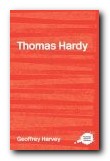Biography, guidance notes, and criticism of Hardy
This comes from a new series by publishers Routledge which offers comprehensive but single-volume introductions to major English writers. They are aimed at students of literature, but are accessible to general readers who might like to deepen their understanding. The approach taken by the Complete Critical Guide to Thomas Hardy could not be more straightforward.
 Part one is a potted biography of Hardy, placing his life and work in a relatively neutral socio-historical context. Thus we get his early influences and ambitions, his rise to fame as a novelist, and then his switch to poetry in later life. The study does not shy away from the difficulties he had in his first marriage and his second marriage to a woman forty years younger than himself.
Part one is a potted biography of Hardy, placing his life and work in a relatively neutral socio-historical context. Thus we get his early influences and ambitions, his rise to fame as a novelist, and then his switch to poetry in later life. The study does not shy away from the difficulties he had in his first marriage and his second marriage to a woman forty years younger than himself.
Part two provides a synoptic view of Hardy’s stories, novels, plays, and poetry. The works are described in outline, and then their main themes illuminated. This is followed by pointers towards the main critical writings on these texts and issues.
Hardy is not an easy writer to categorise. We think of him mainly as a novelist – but he is equally influential (if not so highly regarded) as a poet and a writer of novellas and short stories.
Part three deals with criticism of Hardy’s work. This is presented in chronological order – from contemporaries such as D.H. Lawrence to critics of the present day, with the focus on feminist and gender criticism, Marxist, and psychoanalytic criticism.
The book ends with a commendably thorough bibliography which covers biography, criticism in books and articles, plus pointers towards specialist Hardy journals.
An excellent starting point for students who are new to Hardy’s work – and a refresher course for those who would like to keep up to date with criticism.
© Roy Johnson 2003
Geoffrey Harvey, The Complete Critical Guide to Thomas Hardy, London: Routledge, 2003, pp.228, ISBN 0415234921
More on Thomas Hardy
More on the novella
More on literary studies
More on short stories